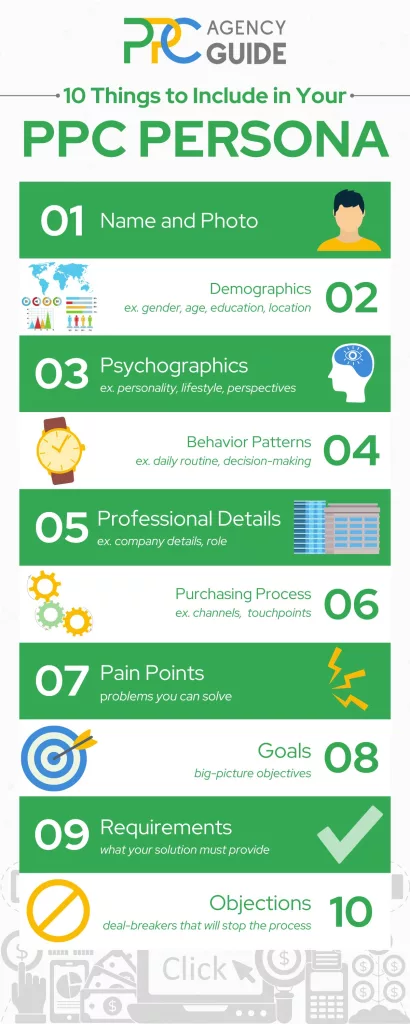
Creating PPC ad personas may seem low on the priority list if you already have a lot on your plate. However, they’re essential to successful PPC advertising campaigns and are easy to set up once you know the basics. Plus, you only have to do it once and can then use your personas across all channels, so it’s well worth the time investment.
On this page, we’ll walk you through how creating PPC ad personas boosts campaign performance, the steps involved, and how to weave them into your asset creation strategy for maximum impact.
What’s a Persona?
Sometimes referred to as buyer personas or customer personas, personas can be thought of as profiles or dossiers of imaginary people that represent potential customers. They help you build marketing campaigns that speak to individual people rather than broad customer types.
Let’s say that you run a financial services company, and your product is a business loan alternative. You might then create a persona named “Jack,” who runs a construction company that requires funding. You have lots of details about Jack that you can use when you build PPC campaigns, so your messaging resonates with him more.
Buyer Persona vs. Target Audience
Most people are familiar with target customers or target audiences. It’s a broad concept that encompasses lots of potential customers. For instance, the financial services company mentioned earlier may have a target audience comprised of small business owners between the ages of 30 and 50. That information can help if you’re targeting groups with your PPC ads. Still, the individuals within that group will come from many different industries, have unique concerns, and require novel solutions. A generic ad may not work for most people within the group, but an ad created with Jack in mind will truly resonate with the right people.
How Personas Boost PPC Campaign Performance
Creating PPC ad personas helps you understand your customers better, boosting results in many areas.
Refine Value Propositions
In most PPC campaigns, you only get a few words to connect with a person. A Google Ad headline, for example, can only be 30 characters long. When you create a strong persona, you know what matters most to your buyer and can build a better value proposition so that the few characters you get to make your point are used wisely and attract more attention.
Preserve Ad Spend
Personas make targeting easy and allow you to speak to your target person. This increases the likelihood that your ad budget will go to your persona and not to someone unlikely to follow through.
Create Cohesive Messaging
Let’s say, for example, your persona Jack is concerned about being tied into a long-term contract. He wants the freedom to leave your company without penalty at any time. Your value proposition ad PPC ads are built around this concept, which puts Jack at ease and interests him. However, Jack clicks your ad and goes to your homepage. There, he learns that one of your programs has a 12-month contract. Jack doesn’t realize it’s a different program. He sees the mention of a commitment and leaves. He loses faith in your company and ignores any future ads.
This type of issue happens all the time. However, when you build all your messaging for a persona, it creates a cohesive user experience. The ideas that interest Jack are present throughout his journey and are reinforced each time. That way, he stays interested, and trust grows.
Streamline the Customer Journey
In a perfect world, Jack would make a purchase the first time he sees your ad. Natural user behavior isn’t so linear. The average customer journey involves three touchpoints, according to Google research. That means someone might start with a basic search for information, then seek feedback from others or compare options. Even if Jack’s mind is made up, he’s still not likely to buy. He’s more likely to seek data to reinforce his decision before moving forward.
If you don’t have a persona, you won’t know what kind of data will make Jack feel at ease about his decision, let alone include it in your advertising initiatives. If you do have a persona, you know what messages Jack needs to see at specific points of his journey and can ensure he sees them so he moves forward more quickly.
Boost Conversion Rates
Research shows that companies that exceed their lead goals are more than twice as likely to have and document personas than their counterparts, according to Businesswire. This is because your campaigns are built from the ground up with a specific person’s needs in mind, and everything surrounds them.
Improve Lead Quality
Personas work almost like a filter because you’re reaching out to a specific person. Your messaging and approach are so specific that others who aren’t a good fit keep scrolling past. This helps ensure that anyone who becomes a lead will likely become an actual customer.
Increase Profit
Personas help you advertise more efficiently. More of your budget goes to people likely to convert, and those who start moving through your funnel are more likely to become customers. This also helps your sales team work more efficiently because their efforts are focused.
Steps to Creating PPC Ad Personas That Work
The results you achieve are only as strong as the personas you create. Follow the steps below to ensure your personas resemble actual customers and you can maximize the benefits.
1. Build a Persona Template
The first step is to create a template you’ll use to create all your personas. Details on what to include are covered below, though you can tailor yours to suit your business and customers.
Name and Photo
Treat your persona like a book character and give them a name. This humanizes them and makes it easier for your team to get into their mindset when creating assets.
Using the persona we began with, our persona’s name is Jack Q. Contractor.
Demographics
Make a note of any personal details about the customer, such as gender, age, and education.
Jack is a 38-year-old man with a bachelor’s degree in business that he obtained while working for a handyman company.
Psychographics
Include details about the person’s personality, lifestyle, and perspectives.
Jack believes trust must be earned and carefully vets prospective vendors or partners. He can make the best of any situation but won’t settle for anything less than total honesty and full disclosure. If there’s a catch-22 or inconsistency in anything, he’ll find it.
Behavior Patterns
Consider what a typical day is like for your persona and how he usually makes decisions.

Jack’s construction company is growing, but he’s still not delegating as much as he could be and follows up on everything his subcontractors do. He spends most of his days on-site. Any business management tasks are usually managed late at night or on weekends. Because of this, he may start a search on his PC at night and then resume research on his phone between activities during the day. He’s very methodical and only moves forward when he’s confident.
Professional Details
Include details about the person’s company, such as industry and size, as well as their role in the company and experiences with it.
Jack owns Acme Construction and Remodel, a company specializing in government projects, such as schools and libraries. He’s been in the industry for over 20 years but only branched out independently after receiving his degree five years ago. He’s the sole decision-maker. He has dozens of subcontractors that work with him regularly but only has five employees.
Purchasing Process
Consider how your persona usually makes big decisions, including how he obtains information, including search queries and channels, as well as what a usual customer journey looks like for him.
Jack understands business finance more than the average person, so he’s more likely to explore solutions tailored to his needs from the start. For instance, his first search query will likely be “construction funding no credit.” From there, he’ll explore the options to find the best solution, then start searching for specific businesses that can help. He’s not a fan of traditional social media, but he maintains a LinkedIn profile to help build business contacts. He routinely reads posts and articles of interest there.
Pain Points
Include details about specific struggles your persona copes with that your business can address.
Jack’s government contracts are lucrative and are sure to pay out, but it takes forever to get paid. He sometimes struggles to pay his subcontractors when expected and cover overhead while he waits for payment. Traditional loans don’t work for these situations, and he doesn’t have strong enough credit to qualify yet, so he needs an alternative way to improve his cash flow.
Goals
Describe big-picture goals your persona has beyond solving immediate pain points.
Jack wants to take on larger projects and scale, but he can’t until he solves his cash flow issues.
Requirements
Consider what things your persona is looking for in the provider they choose.
Jack doesn’t want to sign a long-term contract, but he doesn’t like changing things up unless necessary. Therefore, he’d prefer to work with a company that can continue to help him as his business grows.
Objections
Make a note of your persona’s deal-breakers or anything that will stop them from taking the next step.
In addition to not wanting a long-term contract, Jack expects complete honesty and disclosure. He’ll accept paying slightly higher rates for better service, but if there are hidden fees or the costs change, he’ll end the process.
2. Gather Data
Once you know the type of data you want, you can begin the research process. This part is crucial because it makes your persona’s data useful. A few sources of data are covered below.
Website Analytics
Gather preliminary data from a program like Google Analytics. This can give you basic information such as ages, genders, locations, and interests. If you’re using conversion tracking, strengthen your personas by including details about those who convert and those who don’t.
Customer Data
Pull customer information from your CRM or other internal sources.
Social Media
Use data from your social media accounts to identify who’s engaging with you and what they’re about.
Market Research
Send surveys to your existing customers and prospects. Note traits that those who convert share and differences between those who convert and those who don’t.
3. Rally the Team
Your whole team can benefit from the personas you create and will have information to share. As you build yours out, share details and get feedback from departments such as:
- Marketing
- Sales
- Customer Service
- Product Development
- Management
4. Fill in Your Templates
As you gather data, you’ll likely find that you have multiple target audiences and can build one or more personas that fit within each. Create several personas and share them with key team members to ensure they share traits with actual customers and provide enough information to help people feel like they understand the person.
How to Leverage Personas in Your PPC Campaigns
Share your final personas with your team and incorporate them into your efforts. A few key areas to leverage them in PPC campaigns are covered below.
Targeting
To start, you can use your personas to decide which types of ads to run and on which channels. For instance, if you’re trying to reach a persona like Jack, you can catch him at the top of the funnel on LinkedIn ads or soon after via search ads. You can also narrow down who sees your ad based on demographics and interests.
If you’re skilled in Google Analytics, you may also want to set up Custom Audiences that align with different personas. That way, you can see if their real-world behavior aligns with anticipated behavior and identify which personas are best to focus on.
Campaign Organization and Keywords
Poorly formed ad groups are one of the main reasons PPC campaigns fail. For instance, a brand might build an ad group that hosts most or all its keywords. They may be relevant keywords to the brand or service, but they aren’t necessarily relevant to the individual. Moreover, keywords and themes are supposed to carry over from the search query to the ad and the landing page. It’s impossible to do this when many keywords are lumped together.
Instead, you can organize your PPC campaigns by persona. That way, targeting and selecting appropriate keywords that match is easy. You can also include more negative keywords to prevent your ads from showing for someone who isn’t a good fit for your persona.
Messaging and Asset Creation
Various campaign types will require different assets. For instance, you might need long-form content for boosted or sponsored posts, images that speak to your persona for display ads, and hyper-focused value-oriented copy for your search ads. Make sure everyone on your creative team receives copies of your personas so it’s easier for them to craft assets that feel personalized and create a connection with your reader.
Improve Your PPC Advertising
Creating PPC ad personas can really level up your paid advertising results. If you’re struggling to create yours or aren’t getting results after implementation, it’s best to bring on a pro. An experienced PPC agency can help shore up all areas of your campaigns so your brand gets the results it deserves. To learn more or get started, request a complimentary consultation.


















